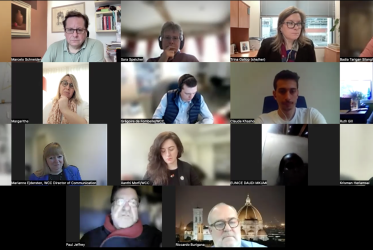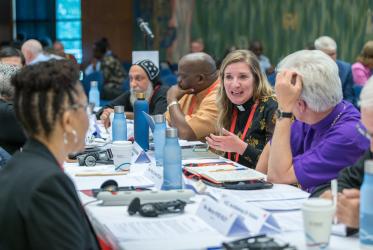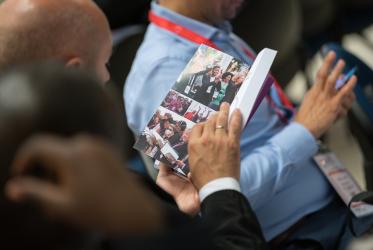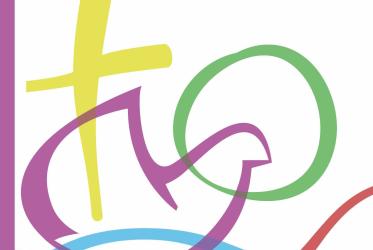The work of planning the assembly began in February 2018 when the Assembly Planning Committee met for the first time at the Bossey Ecumenical Institute, and began discussions.
Through the pre-assemblies and the assembly itself, hundreds of staff and volunteers worked to support the delegates and other participants in their work.
One-hundred-twenty-seven stewards from around the world helped scan badges at meals, hand out and receive headsets, write stories, direct participants around the site, and so much more. Each steward worked at least eight hours per day, meaning that between them, the stewards put in more than 9,000 hours over the span of the assembly!
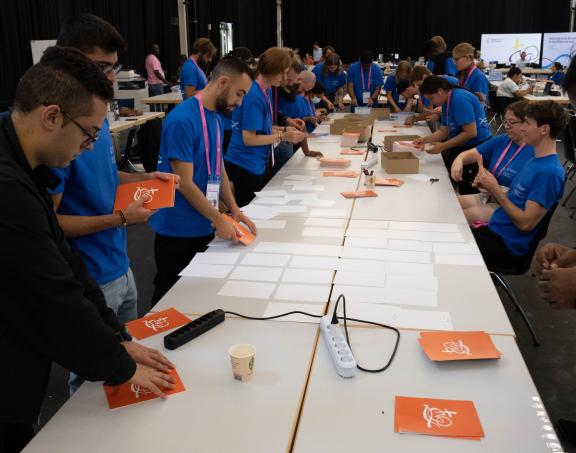
August 30, 2022, Karlsruhe, Germany: Over 120 stewards from around the world are a key part of the team putting on the assembly. Here, many of them assemble cards for use in the consensus decision making model. The 11th Assembly of the World Council of Churches is being held in Karlsruhe, Germany from 31 August to 8 September 2022. Photo: Simon Chambers/WCC
The WCC staff team was bolstered by co-opted staff from churches around the world. Some were physically present in Karlsruhe, while an online presence from staff, co-opted staff, and journalists kept the assembly thriving and highly visible to the world.
The catering team in Karlsruhe fed over 3,500 people two meals a day for nine days, in addition to the pre-assemblies. That means the team provided more than 60,000 meals.
The assembly wasn’t only followed by people in Karlsruhe. Thanks to the communications team, events were livestreamed, articles and photos shared, and more than 300 journalists from around the world were hosted, both in person and online. A production studio in the Gartenhalle broadcast press conferences, interviews, book launches, and more, thanks to the work of more than 120 people from the communications team.
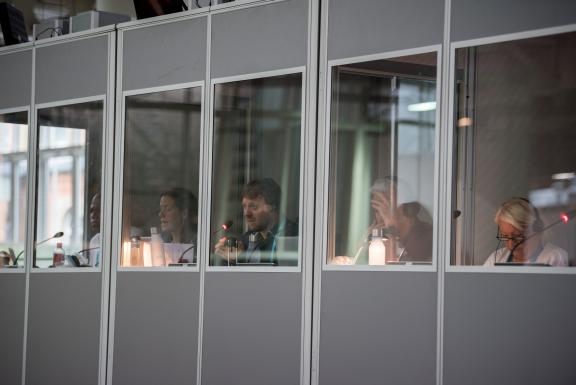
27 August 2022, Karlsruhe, Germany: Interpreters at work during an Ecumenical Youth Gathering that brings together hundreds of youth from all over the world in the lead-up to the World Council of Churches 11th Assembly in Karlsruhe, Germany. The 11th Assembly of the World Council of Churches is held in Karlsruhe, Germany from 31 August to 8 September, under the theme "Christ's Love Moves the World to Reconciliation and Unity."
Material was broadcast and shared in English, Spanish, French, and German, with the help of interpreters and translators, who translated close to 150 reports, stories, and publications for the assembly. Events were also simultaneously interpreted in sign language.
In the Networking Zone, 64 activities were promoted both in the WCC space and on the main stage, covering all programmatic areas of the WCC.
From 26 August - 14 September, just under 14,000 image downloads have been made from the WCC photo archive (single downloads or in batch). The vast majority of them are photos directly from the assembly, but some also from press photo galleries, from an Orthodox Pre-Assembly gallery in Cyprus, and some other occasional downloads.
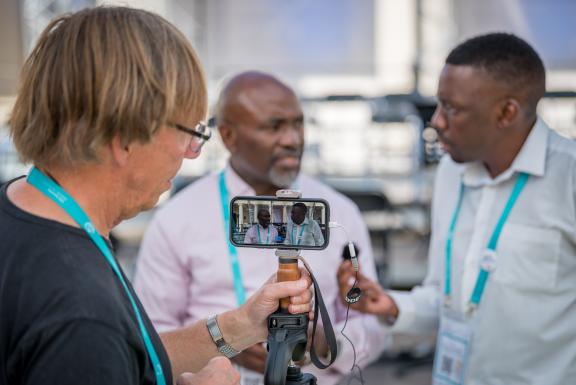
5 September 2022, Karlsruhe, Germany: Livestreamed news summary - here featuring WCC staff Mikie Roberts - being broadcast from the WCC 11th Assembly venue. The 11th Assembly of the World Council of Churches is held in Karlsruhe, Germany from 31 August to 8 September, under the theme "Christ's Love Moves the World to Reconciliation and Unity."
About 650 assembly-related emails arrived in the media inbox between 26 August and 9 September, most of them from journalists. There were 343 media accreditations.
During the assembly, the number of visitors to the WCC website increased three times, with daily visitors numbering 15,000 versus the usual 5,000.
The number of website visitors for the assembly’s opening day—21,000 on 31 August—and opening week—101,000 on 28 August – Sept 4 has broken all the known WCC website attendance records so far.
From 29 August–11 September, the WCC website has been visited by 180,000 users, generating 300,000 page views. Languages of the visitors: 43% English, 27% German, 3% French, 2% Spanish. Top countries where visitors came from (after Germany with 30% of all visits): US, India, Switzerland, UK, Australia, France.
Forty-seven percent of visitors used mobile devices or tablets to access the website during the assembly.

27 August 2022, Karlsruhe, Germany: Assembly web team with members on-site in Karlsruhe and online in Rwanda, Zimbabwe and Nigeria posted content online during the World Council of Churches 11th Assembly in Karlsruhe, Germany. The 11th Assembly of the World Council of Churches is held in Karlsruhe, Germany from 31 August to 8 September, under the theme "Christ's Love Moves the World to Reconciliation and Unity."
From 26 August to 16 September, 130 assembly-related news stories were published on the WCC website, sent out to media, and shared on social media. News and feature stories have been translated also in German, French, and Spanish.
Eighty-nine volunteers from Karlsruhe helped to welcome and orient participants, hosted excursions, and invited the WCC to pray with them in their parishes. A total of 261 events were offered by the local hosts.
Please join in offering a big danke, thank you, merci, and gracias to all the people whose work have made the WCC 11th Assembly a success!
Videos of the WCC 11th Assembly in Karlsruhe, Germany
Photos of the WCC 11th Assembly in Karlsruhe, Germany
Virtual 360º experience of the WCC 11th Assembly in Karlsruhe


